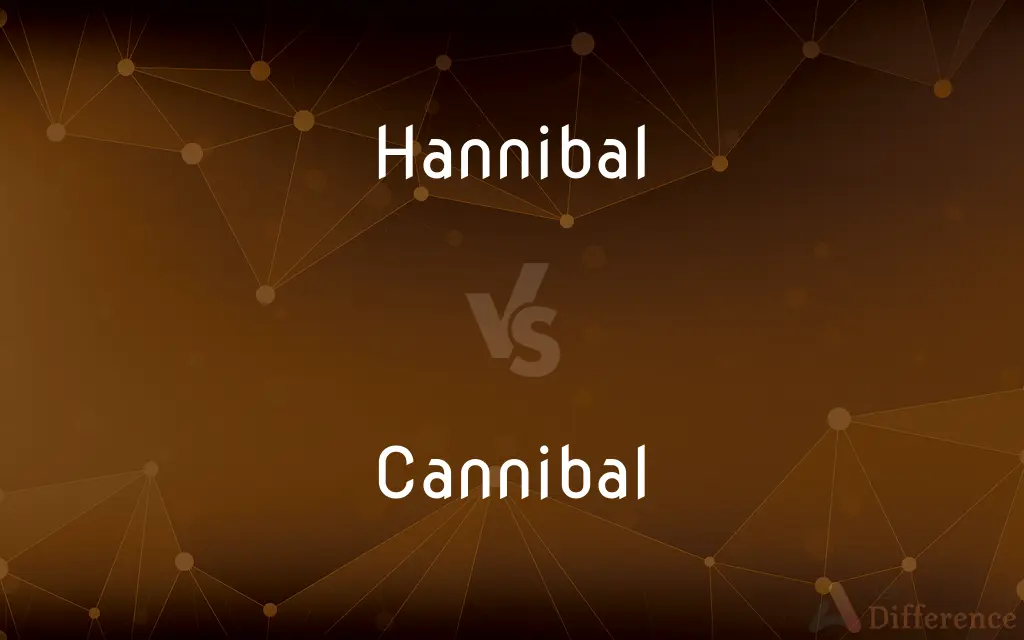Hannibal vs. Cannibal — What's the Difference?
By Tayyaba Rehman — Updated on January 7, 2024
Hannibal refers to a historical Carthaginian general famous for crossing the Alps, while a cannibal is a person who eats human flesh.

Difference Between Hannibal and Cannibal
Table of Contents
ADVERTISEMENT
Key Differences
Hannibal was a Carthaginian general known for his military prowess in the Second Punic War against Rome. Cannibal, on the other hand, describes an individual or entity that consumes the flesh of its own species, particularly humans eating other humans.
The legacy of Hannibal is rooted in history and strategy, symbolizing courage and military genius. Conversely, the term cannibal evokes a primal and taboo aspect of human behavior, associated with survival, ritual, or psychological aberration.
Hannibal's historical impact largely lies in his audacious strategies, like crossing the Alps with elephants, which was unprecedented. In contrast, cannibalism has been a subject of both anthropological study and societal horror, reflecting a breach of a fundamental human taboo.
While Hannibal's name is often associated with leadership, tactical intelligence, and determination, cannibalism is linked with savagery, desperation, or cultural practices in certain societies.
The admiration for Hannibal stems from his defiance against a dominant Rome, making him a symbol of resistance. Cannibalism, however, is universally met with revulsion and fear, often used in storytelling to illustrate the extremes of human behavior.
ADVERTISEMENT
Comparison Chart
Definition
A Carthaginian general known for fighting Rome.
A person who eats flesh of their own kind.
Historical Context
Associated with the Punic Wars and military tactics.
Linked with survival, rituals, or horror.
Cultural Perception
Seen as a symbol of military genius and resistance.
Viewed as a taboo and horrifying act.
Representation
Often admired in historical and military contexts.
Portrayed with fear and revulsion.
Usage in Language
Used to refer to a skilled strategist or leader.
Used to describe extreme human behavior.
Compare with Definitions
Hannibal
Hannibal renowned Carthaginian military commander.
The strategies of Hannibal during the Punic Wars are still studied by military historians.
Cannibal
A representation of the ultimate human taboo.
In that horror film, the antagonist was a feared cannibal lurking in the shadows.
Hannibal
Hannibal historical figure representing military acumen.
His leadership style was often compared to Hannibal in its creativity and boldness.
Cannibal
An individual who consumes human flesh.
The stranded survivors turned cannibal to stay alive.
Hannibal
Hannibal metaphor for overcoming insurmountable odds.
Facing their challenges, they drew inspiration from Hannibal's resilience.
Cannibal
Often used metaphorically to describe corporate or political entities consuming their own kind.
The company was likened to a cannibal, absorbing its competitors ruthlessly.
Hannibal
Hannibalymbol of defiance against Rome in ancient times.
Hannibal's march across the Alps is an epitome of daring and determination.
Cannibal
A term used in anthropology to describe certain cultural practices.
The expedition revealed the presence of cannibal rituals among the isolated tribe.
Hannibal
Hannibaln icon of tactical warfare and ingenuity.
In chess, he often adopted the Hannibal approach, outmaneuvering his opponents.
Cannibal
A symbol of extreme desperation or mental disturbance.
In extreme survival situations, there have been rare cases of cannibalism.
Hannibal
Hannibal (; Punic: ?????????, Ḥannibaʿl Baraq; 247 – between 183 and 181 BC) was a Carthaginian general and statesman who commanded the forces of Carthage in their battle with the Roman Republic during the Second Punic War. Hannibal's father, Hamilcar Barca, was a leading Carthaginian commander during the First Punic War.
Cannibal
A person who eats the flesh of other humans.
Hannibal
General who commanded the Carthaginian army in the second Punic War; crossed the Alps and defeated the Romans but was recalled to defend Carthage and was defeated (247-182 BC)
Cannibal
An animal that feeds on others of its own kind.
Hannibal
A town in northeast Missouri on the Mississippi River; boyhood home of Mark Twain
Cannibal
An organism which eats others of its own species or kind, especially a human who eats human flesh.
Cannibal
A human being that eats human flesh; hence, any that devours its own kind.
Cannibal
Relating to cannibals or cannibalism.
Cannibal
A person who eats human flesh
Common Curiosities
Who was Hannibal?
Hannibal was a Carthaginian general known for his strategies against Rome in the Punic Wars.
What made Hannibal a remarkable military leader?
Hannibal's use of innovative tactics, like crossing the Alps with elephants, showcased his military genius.
What is a cannibal?
A cannibal is someone who eats the flesh of their own species, specifically humans eating humans.
Is cannibalism legal?
Cannibalism is illegal and considered a serious crime in most societies.
Can cannibalism be a survival strategy?
In extreme survival situations, cannibalism has occurred, but it's a last resort and deeply taboo.
Did Hannibal ever engage in cannibalism?
There is no historical evidence to suggest Hannibal engaged in cannibalism.
Is cannibalism ever depicted positively in literature or film?
Cannibalism is typically depicted negatively, although some works may explore its complex aspects.
How did Hannibal impact Roman military tactics?
Hannibal's strategies forced Rome to adapt and improve its military tactics and strategies.
Are there cultures where cannibalism is accepted?
Historically, some cultures practiced ritualistic cannibalism, though it's rare and largely condemned today.
Did Hannibal ever conquer Rome?
No, Hannibal never conquered Rome, although he won several battles against Roman forces.
How is Hannibal remembered in history?
Hannibal is remembered as one of the greatest military commanders in history, admired for his strategic brilliance.
Are there laws against cannibalism in modern societies?
Yes, modern societies have laws that criminalize cannibalism, often under murder or desecration laws.
What was Hannibal's greatest victory?
Hannibal's greatest victory was at the Battle of Cannae, where he defeated a much larger Roman army.
What was Hannibal's fate?
Hannibal eventually was defeated by the Romans and later took his own life to avoid capture.
Is cannibalism a mental illness?
Cannibalism itself is not classified as a mental illness, but it may be associated with certain psychological disorders.
Share Your Discovery

Previous Comparison
Australasia vs. Australia
Next Comparison
Sad vs. AngryAuthor Spotlight
Written by
Tayyaba RehmanTayyaba Rehman is a distinguished writer, currently serving as a primary contributor to askdifference.com. As a researcher in semantics and etymology, Tayyaba's passion for the complexity of languages and their distinctions has found a perfect home on the platform. Tayyaba delves into the intricacies of language, distinguishing between commonly confused words and phrases, thereby providing clarity for readers worldwide.
















































